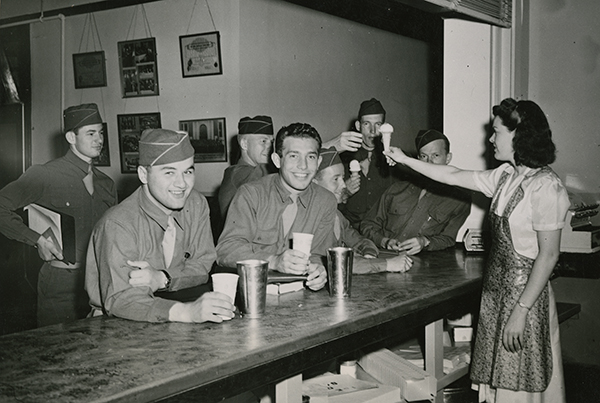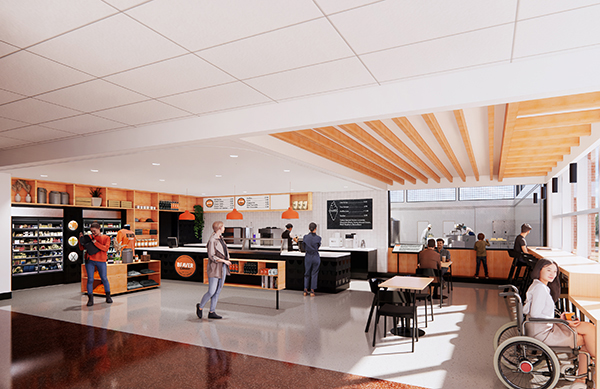From the Spring 2023 issue of the Oregon Stater magazine
By Cathleen Hockman-Wert
For over a decade, Oregon State students guided by faculty experts have been making and selling a variety of award-winning cheeses under the Beaver Classic label. But Beaver Classic is much more than cheese.
Today, you can buy ice cream, beef jerky and honey under the brand, all made by students. What unites these products is that they aren’t just tasty treats. They’re tangible representations of valuable educational experiences. And students are learning much more than how to make good things to eat.
First course: cheese
Beaver Classic started in 2011 with the revitalization of Oregon State’s dairy products program. You can’t make cheese without the right space and equipment, and the university didn’t have a working creamery for decades.
“We didn’t get to make things when I was a student, and when I walked into my first job at Lochmead, I had never been on a production floor. It was terrifying,” said Robin Frojen, ’09, OSU’s creamery and cheese plant manager.
“Now our students can stroll in with confidence. They can move mountains very quickly with the knowledge base they have. We have students who have done every step: they’ve milked the cows, made the cheese, sold the cheese. This is farm to fork at its finest.”
A 2010 gift from Paul Arbuthnot, retired president of Portland-based Sunshine Dairy Foods, and his wife, Sandy, allowed OSU to build the Arbuthnot Dairy Center in Withycombe Hall. Two other key supporters early on were 1983 agricultural and resource economics graduates Kim (Martin) Casale and Carl Casale, industry leaders who own and operate a blueberry farm south of Portland.
“We are so grateful to the Casales and the Arbuthnots. Beaver Classic would not exist today without them,” said Lisbeth Goddik, ’88, Ph.D. ’98, who heads OSU’s Department of Food Science and Technology. She holds two endowed positions in dairy science, including one funded by the Arbuthnots.
Food production, she said, “is one thing in the abstract, but when you actually make something people will eat, it has to be safe. Suddenly you have very different stakes.”
Often students have jobs that pay the bills and nothing else, Goddik continued. The vision for Beaver Classic is to provide opportunities for students to earn money while they gain training and experience that help them forge their careers.
“This term we’re hosting an international dairy company that’s coming here to recruit our students. That didn’t happen 15 years ago; that’s Beaver Classic,” Goddik said. One success leads to the next. “There’s nothing better to a professor than seeing graduates do well in industry and come back to continue to strengthen the university. I absolutely love it.”
A wheely fun place for ice cream
Last September, Withycombe Hall emptied out in preparation for a $51 million overhaul that includes a $20 million dairy plant renovation supported by industry partners as well as the university and the College of Agricultural Sciences.
Lacking a home base, OSU’s cheesemakers have had to roam. In January, Frojen and students went to Rogue Creamery near Medford, spending three days making Beaver Classic cheeses. University Housing and Dining also has provided a place in the Memorial Union for them to make ice cream a few times a week, with help from an electrical upgrade.
 Thanks to a blast freezer donated by the Oregon Dairy Farmers Association, Beaver Classic ice cream debuted in 2021. But you can’t have ice cream without a place to scoop and sell it. And only alumni who have celebrated their golden class reunions can remember going to Withycombe Hall for Beaver-made ice cream, as that shop closed in 1969.
Thanks to a blast freezer donated by the Oregon Dairy Farmers Association, Beaver Classic ice cream debuted in 2021. But you can’t have ice cream without a place to scoop and sell it. And only alumni who have celebrated their golden class reunions can remember going to Withycombe Hall for Beaver-made ice cream, as that shop closed in 1969.
Enter the Beaver Classic food truck, purchased to provide a mobile storefront. The shiny orange truck now appears at Corvallis farmers markets and other events on and off campus, offering grilled cheese sandwiches, ice cream, honey and beef jerky.
Here’s the scoop
One of the first students to make Beaver Classic ice cream is food sciences and technology senior Jubal Bernstein from Eugene. He’s particularly proud of a flavor that’s been a surprise hit: Thai tea. He found the best way to make it is by using what’s essentially a giant teabag to steep tea in the cream base for up to five days before straining the mixture and churning.
“I love seeing people taste it and say, ‘Wow, this is really good!’” Bernstein said. “It makes me really happy.” (Just eat it early in the day, as it’s quite caffeinated.)
Hands-on learning opportunities like these attract students from around the world. Sophomore Sindhura Karuturi came to OSU from Rajahmundry, India. “Growing up, I always wanted to do food science. I’d watch food documentaries on TV and say, ‘I want to be that person,’” she said. “I came across Oregon State, which is so close to a lot of food industries. I was impressed when I saw how much exposure students are getting.”
Since arriving in 2021, Karuturi has found that her work with ice cream and the food truck has helped her find a sense of belonging at the university. “It’s really fun. Our team works very closely together, and we are all passionate about the same things. Beaver Classic has become a family to me.”
We’ve got the meats
A retail butcher shop offering student-made products has been part of OSU’s Clark Meat Science Center — a.k.a. the Meat Lab — ever since it was built in 1967. In addition to serving as a research and teaching facility within the Department of Animal and Rangeland Sciences, the center, managed by Nathan Parker, ’12, M.S. ’16, is a USDA-inspected processing facility.
Usually open Friday afternoons, the Meat Lab store offers an ever-changing variety of products, depending on research and the creativity of students. You might find Thai peanut sausages or links flavored with Sicilian wine and cheese; maple, blueberry, cranberry-apple or pumpkin spice breakfast sausage; tequila lime or sun-dried tomato and basil chicken sausage; hickory-smoked apple-cinnamon bacon. And during the holiday season, community members eagerly order smoked turkeys and hams: special fundraising projects sponsored by the Meat Science Club.
Animal sciences graduate Hannah Walker, ’22, is studying veterinary medicine at OSU. Originally from Hermiston, she hopes to have a rural veterinary practice, ideally focused on cattle and swine. Veterinarians play a critical role in meat production, ensuring that animals are healthy and safe for consumption. The Meat Lab, Meat Science Club and programs like Steer-a-Year have given Walker a comprehensive understanding of the meat products industry, she said. She’s done everything from cutting up a beef carcass to developing a recipe for peppered elk jerky.
“It’s easy to stay in your little bubble of animal agriculture,” Walker said, “but I think it’s super useful and important to understand how the different pieces connect to each other and interplay.”
Pink potato chips
Zak Wiegand, ’09, manager of OSU’s pilot food processing plant, works closely with breeding programs in the College of Agricultural Sciences and U.S. Department of Agriculture to test new types of fruits and vegetables and develop new products.
One day in 2019, a 50-pound bag of pink potatoes from a research field in Boardman arrived at the plant with an idea: how about making mashed potatoes to distribute in the Memorial Union Quad as a promotion during Breast Cancer Awareness Month?
“I thought, pink mashers on the Quad — that sounds terrible,” Wiegand said. “So I suggested we make kettle chips.”
OSU-bred TerraRosa potatoes have high antioxidant levels and disease resistance as well as a unique red color that is retained when they are fried into chips. Student workers made 50 bags of chips in 2019, paused during the pandemic, and then made around 500 bags in 2021 with oil donated by Kettle Foods, a company with Oregon State alumni in leadership.
Everyone loved the Beaver Classic potato chips, but the pilot plant isn’t set up to produce something like that on an ongoing basis: it’s a research facility, not made for large scale production.
While OSU looks for a potential potato chip partner, Wiegand is actively exploring other additions to the Beaver Classic line. “I’ve got a system now to make frozen fruit bars with raspberries, strawberries and marionberries from our breeding program; they’re 95% fruit,” he said. Fermented hot sauces, peppers and tomato sauces are promising; likewise, a coating for roasted, seasoned hazelnuts is in the works.
Up next: New store, Beaver beer?
 When Withycombe reopens — potentially in late 2024 — the entrance on Campus Way will welcome visitors to an ice cream shop and store offering the full spectrum of Beaver Classic products, including fresh and smoked meat products from the Meat Lab.
When Withycombe reopens — potentially in late 2024 — the entrance on Campus Way will welcome visitors to an ice cream shop and store offering the full spectrum of Beaver Classic products, including fresh and smoked meat products from the Meat Lab.
Additional products on the horizon include fresh produce like blueberries and nursery plants from the Organic Growers Club (now sold under the Beaver Classic brand at the Corvallis Farmers’ Market; see page 36). And how about some Beaver Classic beer?
Getting licensed to sell alcoholic products is an extensive process, but Frojen is hopeful that it can be done.
In OSU’s state-of-the-art Research Brewery managed by Jeff Clawson, ’88, M.S. ’94, fermentation science students make 10 or more beers every term in 200-liter (roughly 50-gallon) batches. By law, most gets poured down the drain. Being able to sell the beer as limited-edition brews could generate funds to support the program while refreshing thirsty Beavs.
Currently, students are primarily focused on making Beaver Classic products. Learning opportunities are expanding to other facets of the operation, such as involving agricultural business students with inventory, marketing and distribution.
The hope is to increasingly engage students from other parts of the university. Engineering students have already helped optimize the efficiency of the food truck, and there’s interest in converting its diesel engine to biodiesel.
“We want to encourage collaboration across campus,” Frojen said. “We want Beaver Classic to belong to the whole university.”
Want a taste of student learning? You can buy a variety of Beaver Classic products online at beav.es/beaver-classic. If you’re near Corvallis, look for the food truck or stop by the Clark Meat Science Center on a Friday afternoon or by First Alternative Co-op. Soon you’ll be able to get ice cream at the North Porch Café in the Memorial Union and EBGBs at Marketplace West, too.

